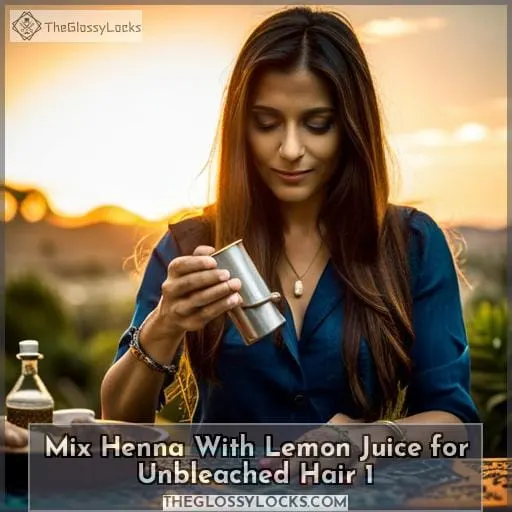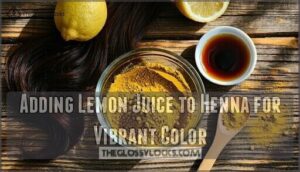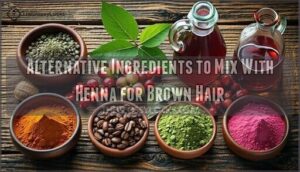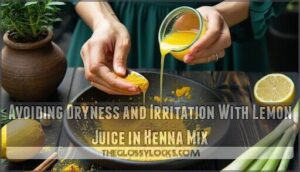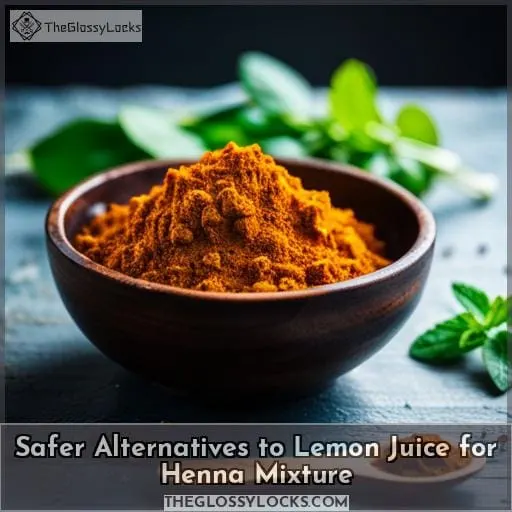This site is supported by our readers. We may earn a commission, at no cost to you, if you purchase through links.
 Weaving together the power of henna and the tartness of lemon juice is an ancient art that has been practiced for centuries to give unbleached hair a natural glossy look. Whether you’re looking for vibrant color or brighter strands, mixing henna with lemon juice can be your go-to solution.
Weaving together the power of henna and the tartness of lemon juice is an ancient art that has been practiced for centuries to give unbleached hair a natural glossy look. Whether you’re looking for vibrant color or brighter strands, mixing henna with lemon juice can be your go-to solution.
In this article, we’ll explore all things related to mixing henna with lemon juice: from its many benefits and how best to mix it, tips on application as well as other acidic mediums which are safer alternatives than pure lemon juice.
You will also get insight into the effects of using this mixture over time so you know exactly what kind of results you should expect! So buckle up – let’s dive in!
Table Of Contents
- Key Takeaways
- Benefits of Henna and Lemon Juice for Hair
- How to Mix Henna With Lemon Juice for Best Results
- Adding Lemon Juice to Henna for Vibrant Color
- Tips for Applying Henna and Lemon Juice Mixture to Hair
- Using Lemon Juice to Lighten Hennaed Hair
- Alternative Ingredients to Mix With Henna for Brown Hair
- Avoiding Dryness and Irritation With Lemon Juice in Henna Mix
- The Effects of Lemon Juice on Hennaed Hair Over Time
- Exploring Other Acidic Mediums for Henna Mixes
- Safer Alternatives to Lemon Juice for Henna Mixture
- Frequently Asked Questions (FAQs)
- What is the best ratio of henna powder to lemon juice for the most vibrant hair color?
- How long does the henna and lemon juice mixture need to stay in the hair for optimal results?
- Is there a way to lighten hennaed hair without using lemon juice?
- How can I prevent dryness and irritation from using lemon juice in the henna mix?
- Are there any safer alternatives to lemon juice for henna mixtures?
- Conclusion
Key Takeaways
- Henna and lemon juice give unbleached hair a natural glossy look.
- Mixing henna with lemon juice is an ancient art practiced for centuries.
- Other acidic mediums like coffee, black tea, amla powder, and indigo powders can be added for browner tones.
- Patch tests should be conducted before applying the mixture to avoid scalp irritation.
Benefits of Henna and Lemon Juice for Hair
You can achieve amazing results and a natural glossy look with the simple combination of henna and lemon juice, offering long-lasting shape and color as well as luster to your unbleached hair.
Mixing henna powder with lemon juice creates a paste-like consistency. You should pour it into an applicator bottle before applying it from root to tip. Detangle your locks in between each stroke of the comb or brush. After allowing it to sit on your head for at least three or four hours, rinse off with warm water.
Lemon juice helps make effects more vivid than they usually would be, so use half as much lemon powder compared to the amount of dry mix you plan on using.
However, do take note that not all acidic substances work similarly. Lime juice has been known to cause photosensitivity while being overly acidic, resulting in darker shades over time. On the other hand, apple/cranberry juices tend towards creating bright coppery hues without drying out the scalp like its citrusy counterpart does (Kristalovino fruit acids have proven especially gentle).
Whatever choice is made, always conduct a patch test first lest you risk having an irritated scalp post-application due to your skin reacting badly. Thankfully, there are plenty of alternatives available that could potentially suit your needs better, such as oils, honey, avocado, banana, etc.
These can be incorporated within homemade nourishing masks alongside pureed fruits/vegetables too.
How to Mix Henna With Lemon Juice for Best Results
Experience vibrant, glossy locks with the magical combination of henna and lemon juice! Mixing these two ingredients together offers unbleached hair an amazing boost in natural luster and radiance. But while this method is safe for any texture, it’s important to conduct a patch test first as acidic substances like lemon juice can cause irritations or skin reactions.
- Gather all necessary materials such as henna powder, an applicator bottle, a comb/brush, and a towel before starting.
- Combine half a cup of freshly squeezed lemon juice with one cup of dry mix to create a paste-like consistency. Then pour the mixture into the applicator bottle before applying it from root to tip on detangled hair strands.
-
Leave the mixture on your head for at least 3-4 hours before rinsing off with warm water. This will help lift cuticles so that the effects become more visible when dye-releasing hennas are used instead of plain ones! Additionally, if you’re looking for darker colors, try adding coffee grounds or black tea leaves too! Just be wary though because highly acidic mixes may darken your hair over time, thus making it harder to achieve desired results later down the line.
Make sure to dilute citrusy liquids accordingly (try using apple/cranberry juices; Kristalovino fruit acids also work wonders).
- Lastly, do note that there’s a potential risk of photosensitivity, thus increasing sunburns whenever using Lemon Juice. So always wear sunscreen protection outdoors during the summer months, even after washing off the Henna paste completely from the scalp area.
Adding Lemon Juice to Henna for Vibrant Color
Adding lemon juice to your henna mix unlocks vibrant, glossy locks with increased natural luster and radiance. It’s a safe method for any hair texture, but it’s recommended that you conduct a patch test first as acidic substances like lemon juice can cause irritations or skin reactions.
The ideal mixing proportions are half a cup of freshly squeezed lemon juice with one cup of dry mix in order to achieve the desired paste-like consistency. This should be poured into an applicator bottle before applying from root to tip on detangled strands.
This combination provides amazing results due to its acidic nature, which lifts cuticles so vivid colors become visible when dye-releasing hennas are used instead of plain ones. Coffee grounds and black tea leaves can also be added if darker tones are sought after! Just bear in mind, though, that highly acidic mixes may darken hair over time, making further adjustments more difficult down the line.
Thus, diluting citrusy liquids accordingly is advised (apple/cranberry juices work wonders).
Other fruit juices such as lime/orange or powders such as Kristalovino acid provide gentle alternatives for those who suffer from irritated scalps, while pure cranberry juice gives bright coppery accents complimentary of lighter hues!
Tips for Applying Henna and Lemon Juice Mixture to Hair
By combining the acidic properties of lemon juice with henna, you can unlock a natural glossy look to your unbleached hair. To ensure the best possible results and protect your scalp from irritation, it’s recommended that you conduct a patch test first.
Once ready, gather henna powder, lemon juice (half as much as powder), a comb/brush for detangling hair after application, an applicator bottle for easy pouring of the mixture into strands, and a towel to cover your shoulders.
Mix both components to create a paste-like consistency before adding more liquid if needed. This will help achieve the desired bright colors! Then simply apply onto dry locks from root to tip while gently brushing through sections until the product has been distributed evenly throughout your tresses.
Keep in mind that highly acidic mixes may darken the color over time, so diluting accordingly is essential when using citrusy liquids such as lime or orange juices instead of pure cranberry or apple ones.
Furthermore, avoid the risk of photocontact dermatitis by applying sunscreen when out during the summer months since these products are photosensitive due to their natural pigment content.
Also, bear in mind that color oxidizes over time due to specific properties found within an appropriate mix.
Using Lemon Juice to Lighten Hennaed Hair
You can lighten hennaed hair with the acidic properties of lemon juice, giving you a fiery and vibrant look that may oxidize to darker shades over time. The key is diluting the lemon juice before applying it in order to avoid drying effects and the risk of sunburn.
Doing a patch test first will also help protect your scalp from irritation caused by citrusy liquids such as lime or orange juices instead of pure cranberry or apple ones.
Alternatively, Malluma Kristalovino Fruit Acid Powder provides bright coppery tones without any negative side effects!
When using lemon juice for dye-releasing henna mixes, always use half as much liquid compared to powder since highly acidic mixtures tend to darken hair color over months or even years when used frequently enough.
The World Henna website offers plenty of advice on how best to utilize these natural products for different hair types.
Finally, bear in mind that lemon juice should never be applied directly onto the skin due to its phototoxicity potential. Diluting accordingly is paramount because this helps extend usage too while avoiding dangerous consequences altogether.
| Benefits | Lemon Juice | Alternatives | Limitations | |
|---|---|---|---|---|
| — Lightening Hair Colour | Yes | Apple & Cranberry Juices | Drying/Irritation Skin |
Alternative Ingredients to Mix With Henna for Brown Hair
If you’re looking for a natural and safe way to achieve beautiful brown hair, henna with lemon juice is not your only option! There are several other ingredients that can be used to get the results you want.
For example, coffee, black tea, amla powder, and indigo powder all work great when mixed together with henna for darker shades of brunette. You can even experiment with apple cider vinegar or room temperature water as an acidic medium instead of lemon juice if desired.
Kristalovino Fruit Acid Powder provides bright coppery tones without any negative side effects, while pure cranberry juice or copperberry fruit acid powder combined with henna will give more vibrant color than ever before! And don’t forget about using apple or orange juices too – they both provide nourishing benefits along the journey towards gorgeous locks! Just make sure to avoid lime juice altogether since it’s highly acidic and phototoxic in nature, so diluting accordingly is paramount here.
With all these alternatives at hand, it should be easier than ever before to mix up some amazing recipes which yield stunning results on unbleached hair in no time at all – from fiery reds through pastel pinks right down into deep dark chocolates; whatever shade takes your fancy, just know there’s something out there waiting especially for you! So go ahead, explore each one until finding that perfect blend worthy enough of being called home by those beautiful tresses.
Avoiding Dryness and Irritation With Lemon Juice in Henna Mix
When mixing henna, consider using cold water for dye release, which slows down the dye release process, resulting in a longer-lasting stain, to prevent dryness and irritation, try diluting lemon juice with distilled water before adding it to your henna mix. Lemon juice is a common acidic medium used in henna dyeing but can be drying and irritating for many people.
Dilution of the lemon juice helps reduce its effects on the hair shaft while still allowing for vivid colors when mixed with organic dyes like henna powder.
For best results, use half as much liquid as you would henna powder to make a smooth paste that will adhere well to unbleached hair strands without dripping or running off easily during application.
If further protection is desired against itching or scalp irritation due to an overly acidic mixture, Kristalovino fruit acid powders are gentle alternatives that offer bright coppery tones without any negative side effects from high pH levels found in traditional lemon juice mixes! You could even opt for pure cranberry juice instead of citrus fruits – both provide nourishing benefits along with vibrant color payoffs! However, it’s important not to overlook lime juices because these have higher acidity levels than their counterparts, which may lead to oxidation issues over time, so they should only be used if diluted accordingly beforehand!
Alternatively, there are other natural ingredients such as apple cider vinegar or room temperature water that can act just like lemon but won’t strip away moisture from your locks, leaving them feeling brittle over time – making sure those gorgeous tresses keep looking luscious far into the future too! With all these avoidance strategies available at hand, choosing protective measures over harsh treatments has never been easier.
The Effects of Lemon Juice on Hennaed Hair Over Time
Over time, the acidic properties of lemon juice can darken hennaed hair, causing it to become up to two shades darker than its original color. This is due to the oxidation process that naturally occurs when exposed to air and sunlight.
If too much lemon juice is used in a henna mix or if it’s left on for too long, this can lead to an undesired hue that cannot be easily reversed. Additionally, excessive use of lemon juice increases the risk of sunburn and phototoxicity on areas where skin contact could occur during application or removal of henna paste from hair strands.
To avoid these issues altogether, try using fruit acids such as Kristalovino powder instead, which offer bright copper tones without any harsh chemicals or drying effects associated with traditional mixes.
For those looking for something more gentle, apple cider vinegar and room temperature water are other natural ingredients perfect substitutes that won’t strip away moisture, leaving locks feeling brittle over time either – so there are plenty of options available here depending upon preference!
It’s important not to note, however, that lime juices should only be included after being diluted accordingly beforehand because they have higher acidity levels than their counterparts – making them more likely to cause oxidation issues over time if used in excess amounts, leading once again to unwanted hues appearing unexpectedly down the track.
With all the strategies at your disposal now, though, choosing protective measures over harsh treatments has never been easier – ensuring gorgeous tresses stay luscious far into the future in every single instance truly!
Exploring Other Acidic Mediums for Henna Mixes
Discover the vibrant and nourishing effects of using natural alternatives like apple cider vinegar or fruit acid powders instead of lemon juice in your henna mix! Natural substitutes provide health benefits, while still giving you beautiful results.
Apple and cranberry juices are especially beneficial for those with colored hair because they help enhance color vibrancy without stripping away moisture or drying out strands.
Fruit acids such as Kristalovino powder offer a great alternative to lemon juice when dye-releasing henna – just one teaspoon is all that’s needed! The benefit here is that it won’t strip away essential oils from your scalp either, leaving behind an irritated complexion after usage, which can often be caused by acidic substances too strong for our body chemistry.
Pure cranberry juice also provides bright coppery tones without the need for any additional chemicals added into the recipe – making this option ideal if you’re concerned about harsh reactions on skin contact areas during application/removal process timeframes respectively speaking!
It’s important not to forget about lime juices altogether though: although more acidic than lemons themselves, their phototoxic nature should only ever be considered once diluted accordingly beforehand so as not to cause oxidation issues further down the track leading towards hues appearing unexpectedly at worst-case scenarios unfortunately enough.
In order to achieve subtle yet effective toning qualities when mixing equal parts of henna powder and desired liquid together (in ratios dependent upon length & current coloration), look no further than utilizing these natural ingredients above today – providing both protection against damaging sunlight rays whilst increasing vibrancy simultaneously at the same time durably – allowing us to feel empowered knowing we’ve made positive life decisions every single instance truly!
Safer Alternatives to Lemon Juice for Henna Mixture
If you’re looking to achieve vibrant results with less irritation, try using natural ingredients like apple cider vinegar or fruit acid powders instead of lemon juice in your henna mix. Fruit acids such as Kristalovino powder provide a great alternative for dye-releasing henna because they have lower acidity levels and won’t strip away essential oils from the scalp during application/removal processes.
Pure cranberry juice is an ideal option if you want bright coppery tones without added chemicals – just one teaspoon is all that’s needed! Additionally, lime juices can be used for toning purposes but should always be diluted beforehand due to their phototoxic nature and oxidizing effects when left on the hair too long.
For those who are new to store-bought hair dyes, it’s important to do a small patch test first before applying any products onto large areas of skin. This will help determine which level of acidic liquid works best with each individual user’s body chemistry accordingly.
Adding warm water into the mixture also helps reduce drying sensations over prolonged usage timescales, so don’t forget about doing that either.
When applied correctly, though, these fantastic fruity solutions will bring out beautiful highlights while delivering nourishing benefits at the same time durably.
Overall, experimenting with different liquids when mixing up your own homemade treatments offers remarkable potentialities regarding overall process completion outcomes.
Frequently Asked Questions (FAQs)
What is the best ratio of henna powder to lemon juice for the most vibrant hair color?
For vibrant hair color, mix equal parts of henna powder and lemon juice. This will give you a glossy finish while enhancing your original hue with long-lasting results. The acidic nature of the lemon lifts cuticles for more vivid colors that gradually oxidize over time.
However, diluting the juice can help reduce drying effects on the skin or scalp irritation.
How long does the henna and lemon juice mixture need to stay in the hair for optimal results?
For optimal results, leave the henna and lemon juice mixture in your hair for at least three to four hours. It will add natural luster and radiance while providing vibrant color that lasts longer than usual.
Is there a way to lighten hennaed hair without using lemon juice?
Yes! Try using diluted apple or cranberry juice as an acidic medium instead of lemon. It will lighten the henna and provide a glossy, natural look without drying out your hair.
How can I prevent dryness and irritation from using lemon juice in the henna mix?
Reduce dryness and irritation from lemon juice in the henna mix by diluting it with distilled water. For a gentler alternative, try Kristalovino fruit acids or pure cranberry juice for vibrant colors without causing skin irritation.
Are there any safer alternatives to lemon juice for henna mixtures?
Yes, there are safer alternatives to lemon juice for henna mixtures. Try diluting the acidity of lemon juice with distilled water or switch to apple and cranberry juices. Kristalovino fruit acids and copperberry fruit acid powder also provide vibrant colors without the harshness of lime juice.
Conclusion
To sum up, henna and lemon juice can work wonders on unbleached hair. Not only does it add natural luster and radiance, but it also provides long-lasting shape and color. However, it’s important to use the right techniques and ingredients to get the best results.
Lemon juice can be drying and irritating, so it’s important to dilute it with distilled water and consider using other acidic ingredients. With the right care and precautions, henna and lemon juice can make a world of difference.
Just remember, when it comes to henna and lemon juice, a little goes a long way.

